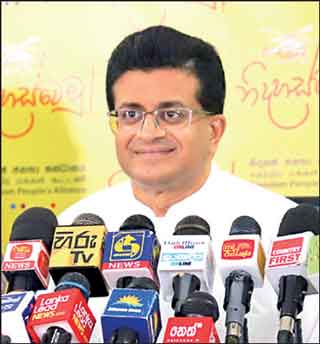Saturday Feb 21, 2026
Saturday Feb 21, 2026
Tuesday, 14 March 2023 00:20 - - {{hitsCtrl.values.hits}}
 |
| MP and Pivithuru Hela Urumaya Leader Udaya Gammanpila
|
MP and Pivithuru Hela Urumaya Leader Udaya Gammanpila yesterday filed an application in the Supreme Court challenging the Central Bank Bill that the latter violates Article 3 and 4 of the Constitution hence needing approval of the people at a referendum.
The respondent in the case is the Attorney General.
At a media briefing Gammanpila said that the enactment of this Bill was a condition imposed by the IMF.
“If there is a conflict between the Constitution and the agreement with the IMF, we can’t amend the Constitution to accommodate the agreement. Instead, the IMF Agreement should be suitably amended to comply with the Constitution,” he said.
According to him in terms of Section 4 of the Bill, the Central Bank is fully owned by the Government. It means public funds have been invested in the Central Bank. However, Section 5 says the Central Bank shall have financial and administrative autonomy.
“How can a public institute exist without Government control? Both Executive and legislature are sensitive to public opinion since they have to face the public every five years for re-election,” Gammanpila questioned.
Noting that the media and the Opposition are also watchful of activities of the Government, the MP said people have no opportunity to appoint or remove Central Bank officers. Therefore, they are not sensitive to the aspirations and welfare of the public. They may act as they wish. In a worst scenario, they may act as advised by the IMF or Western embassies. Hence, crucial public institutes like the Central Bank must always be within People’s radar.
In terms of Section 7 of the Bill, the Central Bank is the banker, financial advisor and fiscal agent of the Government. Section 6 says that the Central Bank shall support the general policy framework of the Government. These two sections reflect the interwoven roles of the Central Bank who formulates monetary policy and the Treasury who formulates fiscal policy. That’s why the Treasury Secretary becomes an ex officio member of the Monetary Board under the prevailing law. “Unfortunately, this Bill has severed this essential link between the Central Bank and the Government by denying a seat of the Governing body to the Treasury Secretary,” Gammanpila noted.
Gammanpila in his application states the following:
(a) The cumulative effect of Clauses 5, 6 and 7 prevent the Executive and Legislature in the formulation of economic policy including the monetary policy of the state. The power to formulate national policy including economic policy is vested in the Government. This power to formulate policy is a component of the executive power of the people and the alienation of that power infringing the sovereignty of the people.
(b) The Bill goes beyond protecting the professional independence of the Central Bank of Sri Lanka and its officials and encroaches into directly exercising executive power in the formulation and implementation of policy to the exclusion of the Executive.
(c) Clause 6(3) prevents the Executive from taking decisions on economic policy other than by legislative action.
(d) The power of the President cannot remove the Governor and members of the governing body and the Monetary Policy Board even if the Governor or the members refuse to implement Government policy. (Vide clause 19)
(e) Compelling the Minister of Finance to sign a Monetary policy framework agreement, fixing an inflation target allowing only to revise the same every three years and in “exceptional circumstances” is arbitrary and violates the sovereignty of the people.
(f) Removing the liability of members of the Monetary Board with regard to pending litigation including proceedings under Article 126 is an encroachment of the judicial power of the people entrenched in the Supreme Court.